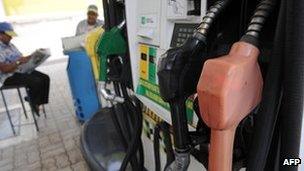India raises diesel price as it looks to trim deficit
- Published

India has announced a sharp rise in the price of diesel, the first increase in more than one year, in an attempt to cut the country's budget deficit.
The government said it would raise diesel prices by 14% from Friday.
India subsidises the prices of diesel, cooking gas and kerosene oil to help the poor and keep inflation in check.
However, this has resulted in a growing budget deficit and there have been concerns the policy may be hurting India's overall economic growth.
The government has been under increasing pressure to cut the subsidies and bring down the deficit.
"It is the first credible step towards fiscal consolidation that the government has taken, something for which the market has been waiting for long," said Manish Wadhawan, head of rates at HSBC.
The government said that it would also limit the sale of subsidised cooking gas to six cylinders a year per consumer.
Ratings boost?
India's economy has slowed in recent months and there have been fears that slow growth coupled with high inflation and a rising deficit may hurt investment in the country.
Earlier this year, ratings agency Standard & Poor's warned that India could lose its investment grade status if conditions in the country did not improve.
Another ratings agency, Fitch, cut its outlook for India's economy to negative in June.
Analysts said the decision by the government was likely to ease fears about a rating downgrade for Asia's third-largest economy.
"The government has shown it can take hard decisions, very difficult decisions," said C Rangarajan, chief economic advisor to the Indian prime minister.
At the same time the price rise has raised hopes that India's central bank, the Reserve Bank of India (RBI), may cut interest rates to spur growth.
"All these days [the] RBI was insisting [the] government should take steps to control [the] fiscal deficit, after this move there are all possibilities that the central bank may consider reducing interest rates," said RK Gupta, managing director at Taurus Mutual Fund.
"This is very good news for the market. Foreign institutional investors will be taking this as a positive step. This will also improve the country's ratings," he added.
'Cruel joke'
While the increase has been welcomed by investors and analysts, some political parties, including one of the allies of the ruling coalition, have already voiced their displeasure about it.
Mamata Banerjee, president of the Trinamool Congress, a key part of the coalition, said that her party was unhappy with it.
"We will not accept it and demand its rollback," she said.
Ms Banerjee's party has previously forced the government to not make proposed hikes in rail fares.
Meanwhile, India's main opposition party, the Bhartiya Janta Party (BJP), labelled the move as a "cruel joke".
"We will not allow this hike. We will not allow this government to loot the common man like this," said Mukhtar Abbas Naqvi, vice president of the BJP.
These comments have led to some concerns that the government may be forced not to increase prices.
"One just hopes that there is no back-tracking of this measure, and they continue to move ahead," said Shubhada Rao, chief economist at Yes bank in Mumbai.
- Published12 September 2012
- Published12 September 2012
- Published1 May 2012